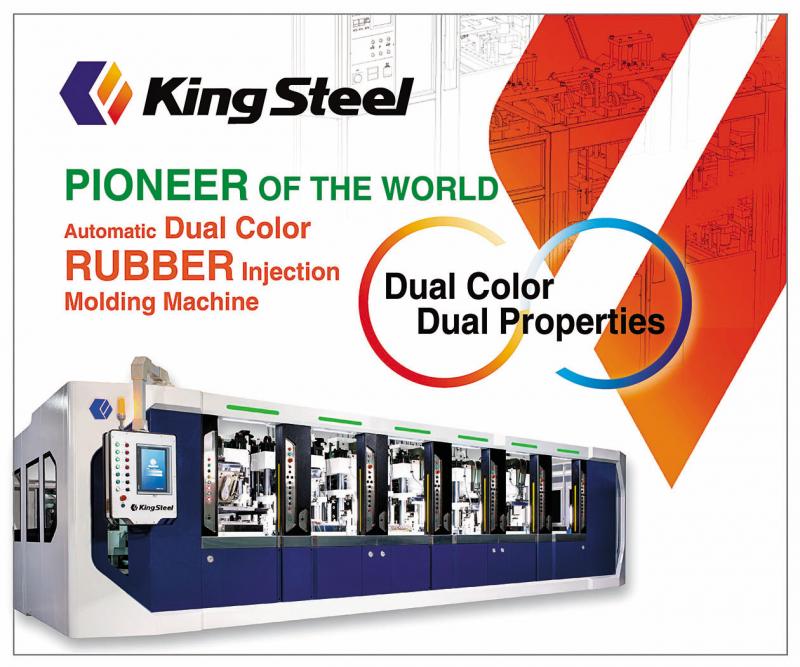The world’s first dual-color rubber injection molding machine, developed by shoe-making machine giant King Steel Machinery Co, has just hit the market. The new machine boasts a number of exclusive advanced functions, including dual shots for both hard and soft materials, multi-injector and multi-mold design and smart manufacturing.
Compared with traditional machines, the new machine reduces manual operation by 60 percent. Because the injection volume for each shot can be controlled with great precision, it is the best solution when manufacturing thinner and lighter sneakers. Since its launch, the hot-selling product has attracted the attention of major international sneaker brands that have introduced the machine into their plants for trial and evaluation for purchase, setting a new trend in the shoe-making industry.
King Steel has specialized for more than 40 years in chemical foaming injection molding equipment, which is used for the injection of ethylene vinyl acetate (EVA) in sneaker insoles and rubber injection for sneaker outsoles.

In order to keep up with ever-changing fashion trends and meet factories’ urgent needs for high functionality equipment, a large part of the company’s annual budget is invested in research and development, product optimization and upgrading. This year, it has taken the lead globally by launching the dual-color rubber injection molding machine, KS9806TL2, which uses fully automated production to replace the traditional manufacturing process, which consists of filling rubber materials and opening/closing molds by hand.
These innovations save customers money, and have been praised as a pioneering industrial invention. With its precise volume control system, the KS9806TL2 is able to precisely control the injection volume for each injection of ultra-thin rubber that is no thicker than 0.7mm. It is the best solution to the industry’s pursuit of light-weighting.
The rubber outsole makes sneakers stronger and more durable. The material is hard-wearing and skid-proof, which are some of the most important characteristics of sneakers. King Steel’s KS9806TL2 can simultaneously combine different materials in dual color, which simplifies the complex process on the outsole production line, as colorful rubber outsoles can be made to perfection through a single injection molding process.
Moreover, rubber outsole production often involves production scheduling difficulties caused by low volume production of multi-color and multi-type products. The KS9806TL2 has multi-injectors that allow flexibility in material use, while at the same time offering a solution for several sole sizes. The multi-station design also ensures multi-mold operations for a mixed production model with high production capacity.
In addition, the efficient operation of the new machine addresses the low efficiency problem of the past single-injector and single-mold design. The machine’s high performance and multi-functional design lowers investment and minimizes the amount of space occupied in the plant, while reducing manpower by up to 60 percent.
(Advertorial)

‘SWASTICAR’: Tesla CEO Elon Musk’s close association with Donald Trump has prompted opponents to brand him a ‘Nazi’ and resulted in a dramatic drop in sales Demonstrators descended on Tesla Inc dealerships across the US, and in Europe and Canada on Saturday to protest company chief Elon Musk, who has amassed extraordinary power as a top adviser to US President Donald Trump. Waving signs with messages such as “Musk is stealing our money” and “Reclaim our country,” the protests largely took place peacefully following fiery episodes of vandalism on Tesla vehicles, dealerships and other facilities in recent weeks that US officials have denounced as terrorism. Hundreds rallied on Saturday outside the Tesla dealership in Manhattan. Some blasted Musk, the world’s richest man, while others demanded the shuttering of his

TIGHT-LIPPED: UMC said it had no merger plans at the moment, after Nikkei Asia reported that the firm and GlobalFoundries were considering restarting merger talks United Microelectronics Corp (UMC, 聯電), the world’s No. 4 contract chipmaker, yesterday launched a new US$5 billion 12-inch chip factory in Singapore as part of its latest effort to diversify its manufacturing footprint amid growing geopolitical risks. The new factory, adjacent to UMC’s existing Singapore fab in the Pasir Res Wafer Fab Park, is scheduled to enter volume production next year, utilizing mature 22-nanometer and 28-nanometer process technologies, UMC said in a statement. The company plans to invest US$5 billion during the first phase of the new fab, which would have an installed capacity of 30,000 12-inch wafers per month, it said. The

MULTIFACETED: A task force has analyzed possible scenarios and created responses to assist domestic industries in dealing with US tariffs, the economics minister said The Executive Yuan is tomorrow to announce countermeasures to US President Donald Trump’s planned reciprocal tariffs, although the details of the plan would not be made public until Monday next week, Minister of Economic Affairs J.W. Kuo (郭智輝) said yesterday. The Cabinet established an economic and trade task force in November last year to deal with US trade and tariff related issues, Kuo told reporters outside the legislature in Taipei. The task force has been analyzing and evaluating all kinds of scenarios to identify suitable responses and determine how best to assist domestic industries in managing the effects of Trump’s tariffs, he

Taiwan’s official purchasing managers’ index (PMI) last month rose 0.2 percentage points to 54.2, in a second consecutive month of expansion, thanks to front-loading demand intended to avoid potential US tariff hikes, the Chung-Hua Institution for Economic Research (CIER, 中華經濟研究院) said yesterday. While short-term demand appeared robust, uncertainties rose due to US President Donald Trump’s unpredictable trade policy, CIER president Lien Hsien-ming (連賢明) told a news conference in Taipei. Taiwan’s economy this year would be characterized by high-level fluctuations and the volatility would be wilder than most expect, Lien said Demand for electronics, particularly semiconductors, continues to benefit from US technology giants’ effort